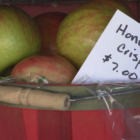Agriculture
New apple storage containers extend life of apples
|
By JASON KRAFT
Capital News Service
LANSING – A new technique would allow Michigan apples to be stored longer without draining their freshness. JMT US, a French company with Okemos offices, recently finished a six-month study of expanding the freshness of stored apples at Michigan State University. The purpose of the study was to compare the apple quality in controlled atmosphere modules with regular cold room storage, according to a recent Lansing Economic Area Partnership (LEAP) report. “It’s making a large box that can hold up to 800 pounds of apples into a modified atmosphere container, which limits the gas movement inside through membranes on the lid of the box,” said Randy Beaudry, a MSU horticulture professor. The low oxygen and elevated carbon dioxide levels in these containers keep the apples from spoiling.
